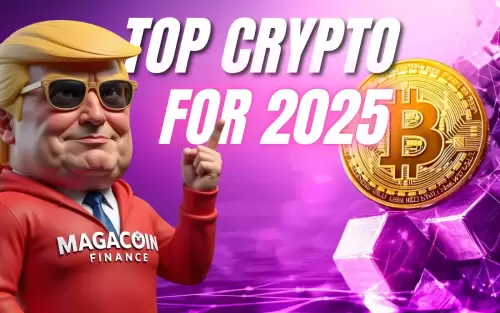 |
|
 |
|
 |
|
 |
|
 |
|
 |
|
 |
|
 |
|
 |
|
 |
|
 |
|
 |
|
 |
|
 |
|
 |
|
Cryptocurrency News Articles
The accumulation of N4 trillion electricity debts by the federal government
May 12, 2025 at 12:23 pm

The accumulation of N4 trillion electricity debts by the federal government, and the threat thus posed to the supply of power nationwide, is unfortunate and certainly does not portray the country as serious both to local business concerns and to potential foreign investors. While President Bola Tinubu is reportedly seeking to meet with electricity generation companies on the huge debt, which accumulated even before the advent of his administration, it will be worthwhile for his government to pay more than perfunctory attention to the debt and how it accumulated.
It will not be sufficient, as Minister of Power, Adebayo Adelabu indicated, that the government plans to pay a substantial part of the debt immediately, and arrange with the GenCos to pay the rest by other means. That is an easy solution that may not endure because it doesn’t take long for such debts to grow again if the causative factors are left unchecked. The government should work to prevent the accumulation of electricity debts, and indeed any other debt, as this will invariably burden the government.
Generation Companies (GenCos) recently warned of an imminent power shutdown due to N4 trillion in debts owed by the Nigerian government for electricity generated and supplied to the national grid. This, of course, will further worsen the power situation in the country. A few months ago, the Nigerian Electricity Regulatory Commission (NERC) threatened to sanction Distribution Companies (DisCos) for failing to complete the migration of Token Identifier of Standard Transfer Specification (STS) meters from Key Revision 1 to Key Revision 2. Now, the GenCos are raising the alarm that the entire country can be plunged into darkness over the non-payment of debts by the federal government.
The Federal Government should immediately settle its indebtedness to the GenCos. The GenCos have complained bitterly about severe liquidity problems. For example, the Chairman of the Board of Trustees of the GenCos stated that the debt, which includes N2 trillion for 2024 and N1.9 trillion in legacy debts, is threatening the continued operation of their power generation plants. A statement has been issued to draw the attention of the Federal Government and key stakeholders to the urgent need for debtors to pay for the electricity they have consumed, as the situation now jeopardises the sustainability of power generation in the country.
The government should lead by example. If it cannot meet its obligations, what can it expect from ordinary consumers? The government must understand that GenCos require funds to purchase gas (which powers many of Nigeria’s power plants), maintain equipment, pay staff, service loans, and invest in infrastructure. The GenCos owe gas suppliers and other service providers. If the GenCos are not paid, they cannot meet their financial obligations, thereby deepening the debt crisis across the entire electricity value chain.
Power is critical for every sector—manufacturing, agriculture, healthcare, education, ICT, and households. Therefore, the federal government must not treat its indebtedness to the GenCos with levity. Electricity is the backbone of national development and critical to the survival of every sector in Nigeria. Timely payments by the government are essential to attract and retain both local and foreign investors. The federal government’s indebtedness to the GenCos sends a negative signal that the Nigerian power sector is high-risk.
Most GenCos operate under Power Purchase Agreements (PPAs) that guarantee regular payments. A government default on these contracts could lead to lawsuits, penalties, and strained relations with key partners.
Unreliable electricity significantly raises the cost of doing business, especially for small and medium enterprises (SMEs). Industries may be forced to cut jobs or shut down entirely, slowing down economic growth. The federal government’s refusal or delay in paying its debts signals to both local and foreign investors that the sector is financially unstable, thereby discouraging further investment. This could derail planned power projects and infrastructure upgrades.
The paradox is glaring: the same government that routinely talks about increasing access to electricity, promoting industrialisation, and driving digital transformation, cannot meet its basic obligation of paying power generators. It makes the government appear unserious. Multinational investors, development partners, and other governments take note of this lack of seriousness. It weakens Nigeria’s negotiating power in global partnerships and discourages foreign direct investment.
Therefore, in the coming days, the Federal Government must act decisively, including making proactive measures not just to pay its debts and prevent the accumulation of such in future, but also in exploring how to increase the efficiency of the power generation and distribution companies. By now, a government committed to improving the welfare of Nigerians, lifting them from poverty and creating jobs for the teeming masses should be seriously exploring the various other options of providing light for its citizens.
Although a few states are trying to leverage the new Electricity Act to expand the frontiers of their power supply, there is little to show that the federal government is equally affected. The government’s recent approval of N10 billion for solar power in the Presidential Villa is an indication of an easy money solution to deep-seated problems. It is like treating the symptoms at
Disclaimer:info@kdj.com
The information provided is not trading advice. kdj.com does not assume any responsibility for any investments made based on the information provided in this article. Cryptocurrencies are highly volatile and it is highly recommended that you invest with caution after thorough research!
If you believe that the content used on this website infringes your copyright, please contact us immediately (info@kdj.com) and we will delete it promptly.






























































